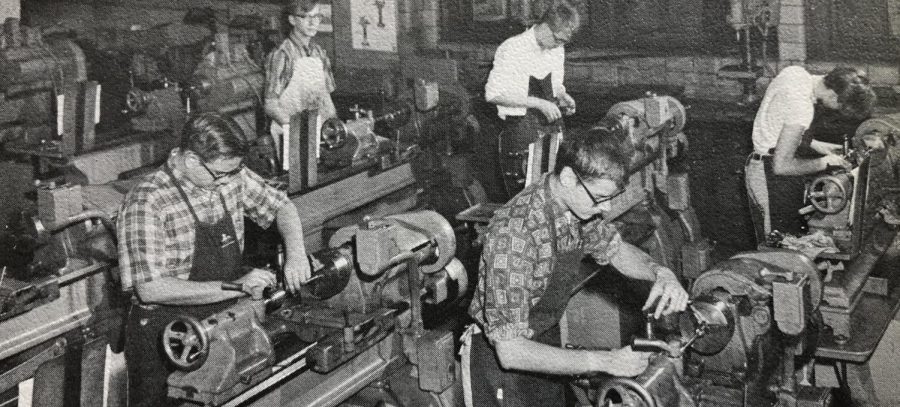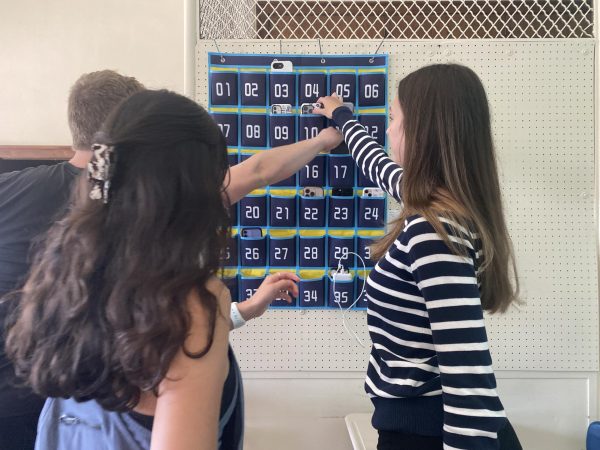Shop classes: a lost art
Throughout the years, shop classes at Lane offered a glimpse into a world of hands on careers, like auto careers and carpentry. (Photo courtesy of the yearbook staff)
If you flip over an item in a store, chances are you’ll see a small brand stating “MADE IN CHINA.” Imagine seeing “MADE AT LANE TECH” instead.
Not too long ago, Lane students were required to take two years of drafting, a class that focused on drawing and scaling an object, such as a building. As the school integrated new technology, students could opt to take a semester of computer drafting, according to George Semenek, who taught drafting at Lane for 14 years.
“We had a dynamite department” Semenek said. “The teachers had so much experience, so we were able to have a lot of drafting classes. [Some classes included] peer drafting, manual drafting and computer drafting.”
After completing two years of drafting, students could then take shop classes, such as wood, metal or electric shop, according to Semenek. Most shop classes were taught on the first floor. Evidence of this can still be seen in the industrial garage doors and metal balconies.
Frank Czaja graduated from Lane in 1968 and became the department chair for shop and drafting classes after teaching at the Chicago Vocational School. He taught at Lane for 14 years in addition to being the building manager.
“It was more hands on stuff you could make to take home with you,” Czaja said, in reference to the different projects that each shop class engaged in. “Electric shop made a small motor, woodshop made a tie rack and a wooden bowl, as well as other small things that students took home.”
Lisa Robinson, class of 1981, remembers her shop experiences fondly.
“I was a terrible student in the academics, but I loved my shop classes,” Robinson said. “I like knowing how things work and have some idea how to fix and build things. My favorite classes were woodshop and machine shop.”
However, during Czaja’s time at Lane, attitudes towards shop classes were shifting.
“The times were changing,” Czaja said. “A lot of people decided kids didn’t need shops anymore and that’s when Lane changed to [a] college prep, even though it was called Lane Tech.” Past yearbooks will show shop classes, like auto shop, persisting through the 2000’s, but drafting was at Lane as recently as 2010.
Today, there are multiple tracks at Lane: Art, Alpha, and Omega to name a few. When the track system was still in its infancy, there were only two tracks: college preparatory and shop. According to Wyman, college preparatory tracks slowly started to dominate over the shop class, which led to shop classes being more likely to be cut.
Shop cuts were not exclusive to Lane, or even Chicago. Starting in the 1950’s, a new school philosophy emerged, one that focused only on college, according to Nicholas Wyman of Forbes. This philosophy eventually culminated in the creation of what we know today as the track system.
This shift has led to a shortage of workers in industries like metal working and tool making.
“They [companies] need people. Some kids are going to college now because they feel they have to,” Czaja said. “And when the kids get out [of school], they can’t find a job and they have nothing to fall back on. A lot of machines now are computerized, but you still need to know how to read blueprints and set up the machines.”
Today, shop classes are slowly starting to make a comeback. Museums and After School Matters offer shop skill classes outside of school. At Chicago Vocational, students take classes in the woodshop rooms through After School Matters, according to the Detroit Free Press.
Lane is slowly starting to reintegrate shop-like classes. Computer science students can take classes like Makers Lab. The lab uses tools, such as 3D printers, to assist in projects, like the Lane of Things sensors that monitor hallway traffic. Self-reliant skills taught in these classes parallel those learned by students in shop classes years before.
“The shops taught kids to take pride in your work. All the guys were happy with being in the shops. Everyone was thrilled when they finished their work and they took it home.” Czaja said. “I still have all my stuff. You [the students] made it. It’s real.”
Your donations directly fund the Lane Tech student journalism program—covering essential costs like website hosting and technology not supported by our school or district. Your generosity empowers our student reporters to investigate, write, and publish impactful stories that matter to our school community.
This website is more than a publishing platform—it's an archive, a research tool, and a source of truth. Every dollar helps us preserve and grow this resource so future students can learn from and build on the work being done today.
Thank you for supporting the next generation of journalists at Lane Tech College Prep!

Sam Schnoes is a current senior at Lane Tech. She is the current news editor of the Warrior. In her free time, she enjoys horse riding, listening to music...




